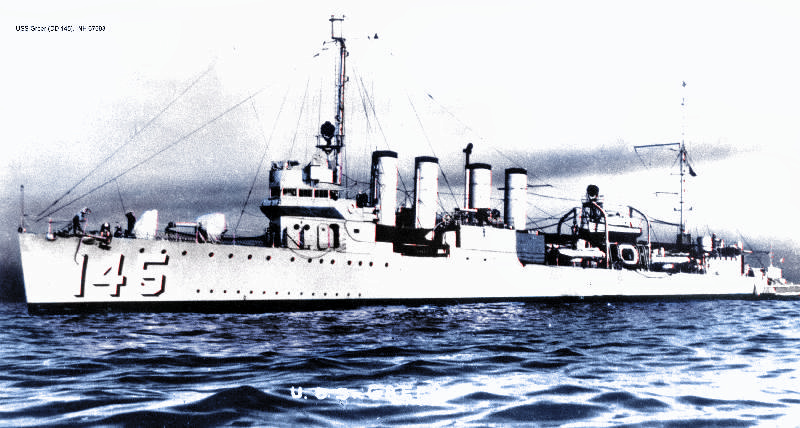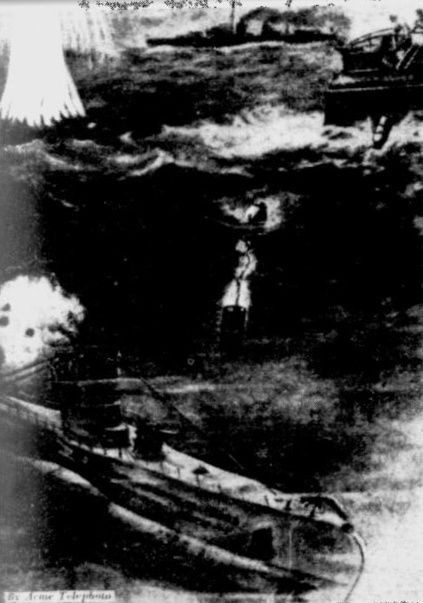The Pittsburgh Press (September 5, 1941)
ROOSEVELT TELLS NAVY TO SINK SUB THAT FIRED ON DESTROYER
Daylight attack in U.S. waters launches hunt
…
By Lyle C. Wilson, United Press staff writer
Washington, Sept. 5 –
President Roosevelt indicated his conviction today that the submarine attack on the U.S. destroyer Greer was deliberate and he disclosed that American naval forces are trying to hunt down and “eliminate” the attacker.
The Greer, en route to Iceland, encountered the submarine yesterday on what Mr. Roosevelt described as the American side of the Atlantic.
He told a press conference that more than one attack was made by the submarine. The Greer itself dropped depth charges, with “results unknown.” Other American warships have joined the search for the submarine.
The President said that the attacks occurred in daylight, during a period of good visibility, and that the Greer was plainly marked as to her nationality.
Mr. Roosevelt was asked whether the incident represented the beginning of an undeclared war between Germany and the United States in the Atlantic. He dismissed the question as too hypothetical. Nor did he specifically say what nationality he believed the submarine to be.
He emphasized that the incident definitely occurred on the American side of the Atlantic. Asked whether the exact location of the attacks might, nevertheless, have been in the blockade zone proclaimed by Adolf Hitler, Mr. Roosevelt replied that the United States recognizes no such zone. The German zone extends westward of American-occupied Iceland almost to the shores of Greenland.
The President would not specify what he meant when he said the submarine had made more than one attack on the Greer, leaving up in the air the question whether he was referring to the launching of more than one torpedo at about the same time or repeated attempts by the submarine to sink the destroyer over a period of time.
The terse announcement of the incident issued last night by the Navy Department here had said:
The USS Greer, en route to Iceland, with mail, reported this morning that a submarine attacked her by firing torpedoes which missed their mark. The Greer immediately counterattacked with depth charges. Results unknown.
Mr. Roosevelt said that the standing orders under which U.S. naval forces now operate are broad enough for them to “eliminate” – his own phrase – the submarine, if and when it is found. He added that “eliminate” was a good word to fit the situation.
He said, with emphasis, that it was very fortunate indeed that the destroyer was not hit when the submarine attacked with torpedoes.
He would not specify how many attacks had been made or how long a period of time they covered.
When the submarine launched its torpedoes at the American destroyer, said the President, the destroyer was alone. The Greer, he said, was clearly marked by the American ensign and her identification number was plainly marked on her sides.
As to the possibility that the submarine fired a torpedo by mistake, he said the fact remains that there was more than one attack.
The President admitted the possibility that the submarine might have fired a torpedo by taking bearings with its listening devices and never actually sighting the destroyer visually.
But, he said, sternly, this is no ameliorating circumstance. The consequences of launching a torpedo blindly at a ship identified only by the sound of its motors carries consequences fully as grave as launching a torpedo at a ship identified specifically as an American naval vessel, he said.
The President explained the American position thus: It reminded him of an incident in which school children on their way to classes were fired upon one day by a marauder who shot at them from some bushes. The father of the children, he said, took the position there was nothing to do about it – not even search the bushes – because the children were not hit by the gunfire.
That is not the position of this government in the attack upon its destroyer.
The bushes are being searched, he said, and the government of the United States specifically rejects the position of the allegorical father and takes the position that something can be done.
The President said grimly that it might be said that the school teacher of the allegory is conducting the search, identifying himself as the school teacher.
Mr. Roosevelt, however, said that no new orders had been issued to the American naval units operating in the Atlantic as a result of the incident, implying that the orders under which these units are now operating are broad enough to permit them to “eliminate” the attacking submarine should they track it down. As to specifically what these present orders might be, Mr. Roosevelt offered a broad hint with the direct question:
What would you do if somebody fired a torpedo at you?
The President insisted that the destroyer emphatically was on the American side of the ocean, but declined to say exactly what its position was when the submarine attacked.
A reporter inquired whether its position might have been definitely on the American side yet still within the belligerent zone proclaimed by Germany. The German zone extends close to Greenland.
Mr. Roosevelt answered this question by refusing to recognize the existence of such a zone of belligerency in the Atlantic.
The United States government, he said, has never been notified of Hitler’s belligerent zone. Secondly, he said, this area is supposed to be a blockade and everyone knows that a blockade is completely without meaning unless it is effective, and the fact remains that there is no effective blockade.
He was asked whether it was possible that a mistake was made in the attack on the destroyer.
He replied by explaining the operations of submarine warfare. If a submarine had its periscope above the surface, he said, there is no excuse for a wrong identification.
He added that most torpedoes are fired by visual sighting through a periscope projected above the surface.
He qualified this, however, by admitting that most submarines, including those of Germany and Italy, have listening devices which can locate with some accuracy the position of a vessel from the sound of its motors without displaying a periscope. Therefore, said the President, it is physically possible for a submarine to fire at a sound without displaying its periscope.
He added immediately that the consequences of such a blind attack would be fully as grave as an attack launched after proper visual identification.
The President was specific in insisting that visibility conditions were such at the moment of the attack that the Greer’s identity should have been established by the submarine. The attack occurred in full daylight, he said.
A reporter asked:
There was no fog?
The President again said the visibility was good.
Both interventionist and isolationist Senators took the view that the Greer incident was the type that was to be expected. It was pointed out that the destroyer attacked is identical to many of the 50 American destroyers traded to the British and, therefore, the submarine commander, presumably German, fired his torpedoes at what he took for a legitimate enemy target.
The destroyer involved was of the World War I variety Flush Decker, 14 of whose sister ships now fly the British flag, and her commander is Lt. Cmdr. Laurence H. Frost. She was not hit.
It was believed that the attack occurred Thursday morning because the commander of a neutral warship would hardly lose any time in reporting a belligerent attack to his superiors.
It was assumed that the attack was made by a German submarine, though a few Italian submarines are believed to have operated in the Atlantic from time to time.
Chairman Robert R. Reynolds (D-NC), of the Senate Military Affairs Committee, said:
It seems there was no damage done to the U.S. destroyer.
…and that seemed the controlling factor in the formulation of Congressional opinion.
‘We can expect such’
Senator Allen J. Ellender (D-LA), an advocate of administration foreign policy, said:
We can expect such incidents. These are the risks we are taking.
Senator Claude Pepper (D-FL), one of the most insistent advocates of force against the Axis, said:
We have seen fit to occupy Iceland and naturally we will see our supplies get there. If any opposition such as this develops, we will simply have to overcome it.
Senator Joseph C. O’Mahoney (D-WY) said:
My judgment is that the commander of the destroyer did exactly the right thing. The fact is that the aggressor nations don’t want us in a shooting war. Their policy is to take nations on one by one. If a submarine fired at the destroyer, it was a mistake.
Senator Edwin C. Johnson (D-CO), an isolationist, said:
We should be very thankful that the incident turned out as it did. Of course, we are not going to war over this incident.
‘Neither act warlike’
Senator George D. Aiken (R-VT) said:
I take these incidents with a grain of salt. It is just too bad you cannot believe everything you hearm, even when it comes to high officials – but you simply can’t.
It was the second incident growing out of the Icelandic patrol. Secretary of the Navy Frank Knox told a Congressional committee recently that a United States warship heard, through its listening devices, the whirl of a submarine’s motors while rescuing survivors from a torpedoed merchant ship. The warship dripped depth charges to “warn” the submarine off, he said.
122 aboard destroyer
The Greer was the first American warship attacked in the Atlantic since the war started, though the Japanese bombed and sank the American gunboat Panay in the Yangtze River, China, in 1937, and damaged the gunboat Tutuila at Chungking recently, She apologized for both incidents and paid heavy indemnity for the Panay. The freighter Robin Moor, flying the American flag, was torpedoed and sunk in the South Atlantic May 21, by a German submarine.
The Greer had nine officers and 113 men abroad.
She has four stacks, was launched Jan. 9, 1918, and commissioned Dec. 31, 1918. She has a displacement of 1,090 tons and is 309 feet long at the waterline. She carried four 4-inch .50-caliber guns besides anti-aircraft guns and depth charge equipment.
Lt. Cmdr. Laurence H. Frost is master of the Greer. A veteran of 15 years in the Navy, he took charge of the ship iust a month ago – Aug. 4 – after serving here in the Navy Department. He was born 39 years ago in Fayetteville, Ark., but has made his home here for many years. He married a Washington girl in 1929 and has a 9-year-old son.


